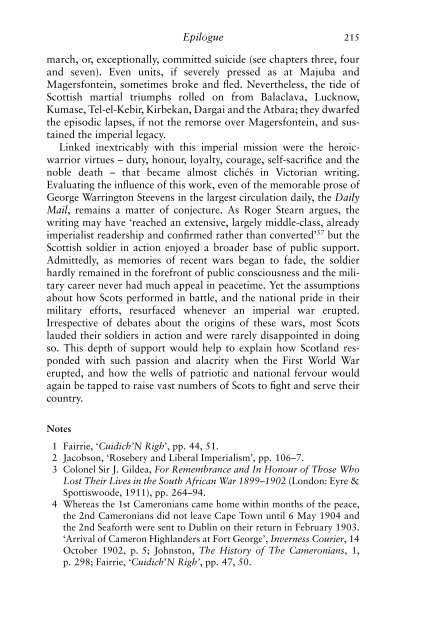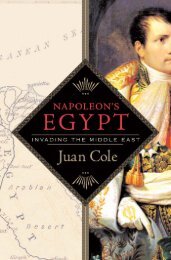The Scottish soldier and Empire, 1854-1902 - Reenactor.ru
The Scottish soldier and Empire, 1854-1902 - Reenactor.ru
The Scottish soldier and Empire, 1854-1902 - Reenactor.ru
Create successful ePaper yourself
Turn your PDF publications into a flip-book with our unique Google optimized e-Paper software.
Epilogue 215<br />
march, or, exceptionally, committed suicide (see chapters three, four<br />
<strong>and</strong> seven). Even units, if severely pressed as at Majuba <strong>and</strong><br />
Magersfontein, sometimes broke <strong>and</strong> fled. Nevertheless, the tide of<br />
<strong>Scottish</strong> martial triumphs rolled on from Balaclava, Lucknow,<br />
Kumase, Tel-el-Kebir, Kirbekan, Dargai <strong>and</strong> the Atbara; they dwarfed<br />
the episodic lapses, if not the remorse over Magersfontein, <strong>and</strong> sustained<br />
the imperial legacy.<br />
Linked inextricably with this imperial mission were the heroicwarrior<br />
virtues – duty, honour, loyalty, courage, self-sacrifice <strong>and</strong> the<br />
noble death – that became almost clichés in Victorian writing.<br />
Evaluating the influence of this work, even of the memorable prose of<br />
George Warrington Steevens in the largest circulation daily, the Daily<br />
Mail, remains a matter of conjecture. As Roger Stearn argues, the<br />
writing may have ‘reached an extensive, largely middle-class, already<br />
imperialist readership <strong>and</strong> confirmed rather than converted’ 57 but the<br />
<strong>Scottish</strong> <strong>soldier</strong> in action enjoyed a broader base of public support.<br />
Admittedly, as memories of recent wars began to fade, the <strong>soldier</strong><br />
hardly remained in the forefront of public consciousness <strong>and</strong> the military<br />
career never had much appeal in peacetime. Yet the assumptions<br />
about how Scots performed in battle, <strong>and</strong> the national pride in their<br />
military efforts, resurfaced whenever an imperial war e<strong>ru</strong>pted.<br />
Irrespective of debates about the origins of these wars, most Scots<br />
lauded their <strong>soldier</strong>s in action <strong>and</strong> were rarely disappointed in doing<br />
so. This depth of support would help to explain how Scotl<strong>and</strong> responded<br />
with such passion <strong>and</strong> alacrity when the First World War<br />
e<strong>ru</strong>pted, <strong>and</strong> how the wells of patriotic <strong>and</strong> national fervour would<br />
again be tapped to raise vast numbers of Scots to fight <strong>and</strong> serve their<br />
country.<br />
Notes<br />
1 Fairrie, ‘Cuidich’N Righ’, pp. 44, 51.<br />
2 Jacobson, ‘Rosebery <strong>and</strong> Liberal Imperialism’, pp. 106–7.<br />
3 Colonel Sir J. Gildea, For Remembrance <strong>and</strong> In Honour of Those Who<br />
Lost <strong>The</strong>ir Lives in the South African War 1899–<strong>1902</strong> (London: Eyre &<br />
Spottiswoode, 1911), pp. 264–94.<br />
4 Whereas the 1st Cameronians came home within months of the peace,<br />
the 2nd Cameronians did not leave Cape Town until 6 May 1904 <strong>and</strong><br />
the 2nd Seaforth were sent to Dublin on their return in Feb<strong>ru</strong>ary 1903.<br />
‘Arrival of Cameron Highl<strong>and</strong>ers at Fort George’, Inverness Courier, 14<br />
October <strong>1902</strong>, p. 5; Johnston, <strong>The</strong> History of <strong>The</strong> Cameronians, 1,<br />
p. 298; Fairrie, ‘Cuidich’N Righ’, pp. 47, 50.

















